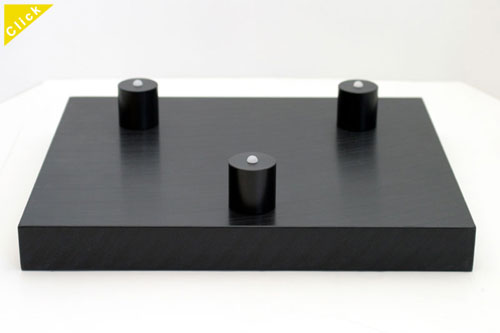The Garden of edenSound
Shortly after the show, I e-mailed edenSound to find out more about the company and that material. Dan Sherbrook answered immediately, and a dialog began. Dan and his wife are people after my own heart. As Dan described, they constitute "a largely self-contained and self-sustaining homestead on an historic 19th-century farm in Vermont. Here we make almost everything we need ourselves -- and enjoy doing it." Dan is a resourceful fellow, a renaissance man. He studied high-energy particle physics and the history of ideas, and he has trained machinists in sub-Saharan Africa, administered an inpatient substance-abuse treatment facility, and worked as a freelance copyeditor. By 2005, Dan and his wife "had tired of the waste and inverted priorities of life in the American city," so they moved to the country and founded edenSound. Ah, the splendid isolation. The edenSound product line is small and highly focused: just vibration-control accessories, each with a twist. Take that chocolatey material, which Dan has dubbed TerraStone, used for the platforms at the RMAF and other edenSound products. It's an extremely high-molar-weight copolymer blend that's unique to high-end audio. Dan quotes the source from which he gets it, which claims that it's an "amorphous, opaque, engineering thermoplastic with a balance of properties (and cost) not unlike nylon but without nylon’s high water absorption and consequent dimensional instability." "Bottom line: it works!" Dan proclaims, adding that machining it is no easy task. "It's very difficult to turn into a smooth surface on my lathe. I've had to relearn everything." Dan had to eschew carbide blades in favor of hardened steel, and he gain some insight from engineers using a similar copolymer in the manufacture of medical devices: "a special coolant allowed me (finally) to get the smooth finish seen on the TerraStone footers." Those footers ($55 each) are edenSound's most unique product: a puck of the TerraStone material with a carbon-filled copolymer bearing on top. The component sits on the bearing, isolated from structure-borne vibration. I used the footers with CD players, phono stages and a preamp or two, and they improved focus in every case, making image outlines sharper and more distinct from the background, which also seemed a bit blacker. What makes the TerraStone footer unique, however, is a property of the copolymer bearing: it dissipates static electricity, channeling it into the TerraStone material underneath. When Dan first told me this, I was reluctant to test it here in Arizona, where static is a year-round issue. What if the footers didn't work and I zapped an expensive piece of audio equipment I was reviewing? "It was an accident" wouldn't cut it. So I improvised. I put an old Pioneer DVD player I had lying around atop the TerraStone footers, shuffled my feet to build up a good static charge, and touched the faceplate. Nothing. I removed the footers and did the same thing. Nothing again. It then occurred to me that the faceplate of the DVD player was plastic, which wouldn't conduct static. I touched the metal case and, sure enough, felt the shock. Back on the footers the DVD player went, making sure its metal bottom touched the bearings, and no matter how vigorously I shuffled, the player never gave me another jolt. Solid-brass and tungsten bearings are also available for $6 each, but with them the TerraStone footers don't have the static-killing property. Dan says the metal bearings do improve the sound with certain products. Dan also makes more traditional all-brass footers, which he calls Bearpaws ($15 to $95 each, depending on size). They are large and heavy as such footers go, tapering from a flat surface to a nipple-like point at their bottom. These worked well screwed into my Timbre Technologies TT-1 digital-to-analog converter, a vintage piece that still sounds wonderful fifteen years after it was manufactured. Timbre supplied screw-in metal spikes with each DAC, and many owners replaced these with ones of their choosing, the Black Diamond Racing cones being especially popular. I have a set of these and prefer the edenSound Bearpaws, especially atop a TerraStone platform ($100 per square foot in 1" thickness), the combination again improving image focus along with soundstage specificity, and increasing overall airiness as well. The platforms are milled from slabs of TerraStone 1" to 4" thick. Dan leaves them somewhat rustic in appearance, instead of smoothing away all of the milling marks. The platform will be obscured by a piece of audio equipment anyway, and the added time needed for smooth finishing would only add to the cost. There are other edenSound products, including Bearpaw CP spikes for underneath speakers ($11 to $32 each), brass damping weights ($15 to $60 each), and plinths milled from black Vermont marble that include a constrained-layer viscoelastic membrane on the bottom ($169). As far as audio accessories go, these prices are low, even embarrassingly so compared to those of similar products from other makers. Chinese knockoff artists would have a hard time beating them. Milling armboards from TerraStone seems like a natural next step, given that Dan and his wife are self-professed analog diehards. A line from one of Paul Bolin's reviews comes to mind as
I think about Dan Sherbrook and edenSound: "I like things to be as simple as
possible, but no simpler." Dan's products are certainly simple, which helps keep
their prices low. They're also effective, and they need to be no more complicated than
that. |

